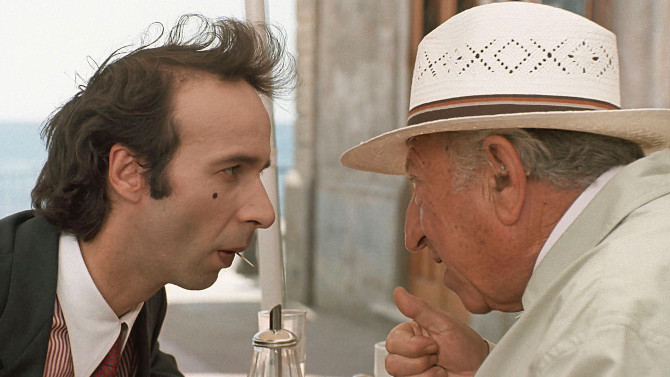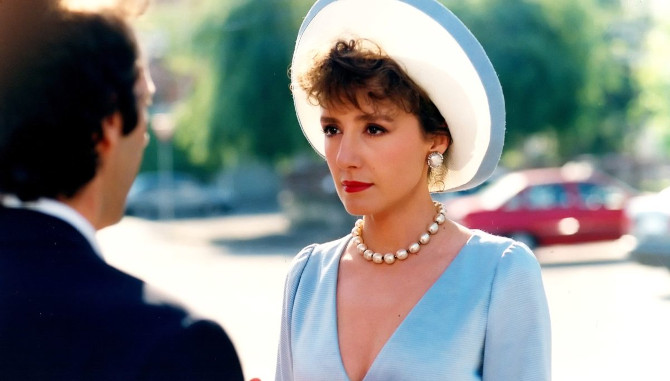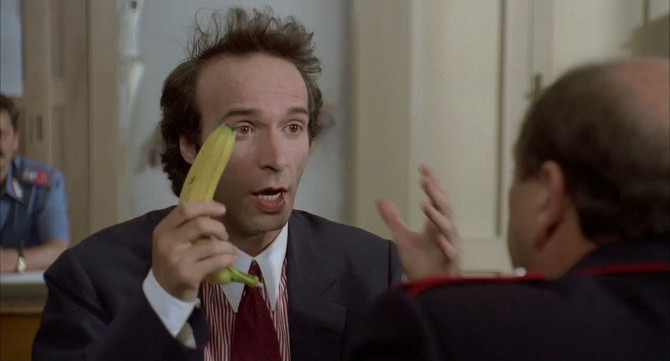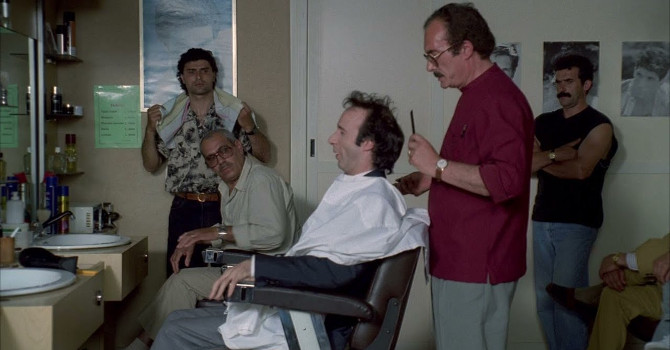There is no doubt that Roberto Benigni will forever have his name etched in the annals of film history after his Academy Award winning film Life is Beautiful – which took home Best Foreign Language Film, Best Score (for Nicola Piovani), and brought forth a most special moment when Benigni climbed atop the seats of the theatre to accept his Best Actor award. Yet, it is a bit of a shame that some of his pre-1997 works are lesser known outside of his native Italy. Case in point, the comedy Johnny Stecchino, circa 1991.
Co-written (along with Vincenzo Cerami), directed and starring Benigni, he plays the titular character as well as a near identical lookalike of the man (who is actually our protagonist). Here’s a quick translation – Stecchino means toothpick. So, to explain, Dante is a charming yet rather simple bus driver (who is also trying to pull a disability scam with the government), when one day, he luckily. . . or perhaps unluckily, almost gets run into by a beautiful woman named Maria (Nicoletta Braschi – Benigni’s real life wife) – who seems to be immediately intrigued by the man. As she would exclaim – “Santa Cleopatra!”
Soon asking him to dress up, put a toothpick in his mouth, draw a fake mole on his cheek, and answer to the name ‘Johnny’, she is making him into the man of her dreams. . . and that man is Johnny Stecchino – an infamous Sicilian mobster who is hiding for his life in his hometown of Palermo. Unaware of any of this, poor Dante is more than keen for the trip to meet up again with the striking woman who seems to have a strong interest in him. . . walking right into a trap that will most definitely endanger his life. Will Dante be able to bumble his way through Palermo while both looking like and answering to the name Johnny? Could the real Johnny walk away, free and clear? Or, might Maria have a change of heart as she puts this simple man into the line of fire?
No matter in what era of film history, it is close to impossible to find scripts that are near perfection. . . though rare stand outs do come to mind (Casablanca, In Bruges, Parasite to name but three of an exclusive list), while Johnny Stecchino is another one. Not only cleverly written and funny, somewhat like Martin McDonagh’s In Bruges, any line or gag, even if it feels like a throwaway joke or a simple comedic bit, will come back into play in a majestic reworking that will be wholly unexpected – be it a banana, a late night party game, or a bag of cocaine.
Combined with Benigni’s comedic charm, he might be the closest modern comparison to the legendary Charlie Chaplin, not only for his ability to write, direct, and star in his own motion pictures, but for his natural physical ability and the twinkle in his eye. The things he can do with his body, be it a random comedic twitch or something much more complex (like walking up a doorframe while being forced in a specific direction by someone from behind), is immediately reminiscent of the silent film stars, while his characters, be it the much more famous Guido in Life is Beautiful, or Dante in this one, pairs the comedy with a melodramatic gravitas the Tramp was so famous for during the Silent Era. It is perhaps no surprise then that Benigni’s Johnny Stecchino finds great comedy, as well as some pathos, in a case of mistaken identity, as that is exactly what Chaplin did in The Great Dictator fifty-one years earlier in 1940. Likewise, similar themes can be found in Benigni’s next film, 1994’s The Monster, and of course Life is Beautiful – three years after that.
A most entertaining comedy that is well worth tracking down, Roberto Benigni’s Johnny Stecchino is laugh out loud entertainment from beginning to end. So popular in its native Italy, not only did it become the top earner of the year, but it also came to sit at number one for the all-time Italian box office. . . and, still, all these years later, remains in the top ten. So, take a trip to Italy this winter. . . just don’t forget your toothpick.
This film is in Italian with English subtitles




